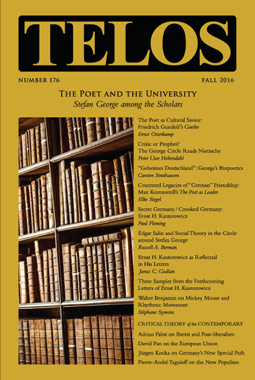“Today words like ‘persevere’ and ‘hero’s death’ had been so ceaselessly bandied about that they had long since acquired an ironic sound—at least wherever there was actual fighting. . . . Once, before an attack, Sturm had heard an old sergeant say the following: ‘Kids, we’re going over there now to gobble up the Englishmen’s rations.’ It was the best battle address that he had ever heard. That was surely something good in the war—that it destroyed glorious-sounding phrases. Concepts that hung fleshless in the void were overcome by laughter.”
—Ernst Jünger, Sturm, describing the Battle of the Somme, whose centenary is this year.
|
“Every fundamental order is a spatial order. One speaks of the constitution of a country or a piece of earth as of its fundamental order, its Nomos. Now, the true, actual fundamental order touches in its essential core upon particular spatial boundaries and separations, upon particular quantities and a particular partition of the earth. At the beginning of every great epoch there stands a great land-appropriation. In particular, every significant alteration and every resituating of the image of the earth is bound up with world-political alterations and with a new division of the earth, with a new land-appropriation.” “Two reefs tower in front of the anarchist. The first, the state, must be overcome, especially in a hurricane, when the waves soar. He ineluctably runs aground on the second one, society, the very image that flickered before him. There is a brief intermezzo between the fall of the legitimate powers and the new legality. Two weeks after Kropotkin’s funeral cortege, in which his corpse had followed the Black Banners, the sailors of Kronstadt were liquidated. This is not to say that nothing had happened in between—Merlino, one of the disillusioned, hit the nail on the head: ‘Anarchism is an experiment.’” “The vastness and deadly desolation of the field, the long-distance operation of steel machines, and the relay of every movement in the night drew an unyielding Titan’s mask over the proceedings. You moved toward death without seeing it; you were hit without knowing where the shot came from. Long since had the precision shooting of the trained marksman, the direct fire of guns, and with it the charm of the duel, given way to the concentrated fire of mechanized weapons. The outcome was a game of numbers: Whoever could cover a certain number of square meters with the greater mass of artillery fire, won.” “The human receives a particular historical consciousness from his ‘space,’ which is subjected to great historical transformations. The variegated forms of life correspond to equally differentiated spaces. Even within the same time period, the environment of individual humans for the practice of daily life is already defined differently by their different life occupations. An urbanite thinks the world otherwise than does a peasant farmer, a whale-fish hunter has another living space than an opera singer, and to a pilot the world and life appear otherwise not only in other lights but also in other quantities, depths, and horizons.” |
||||
|
Privacy Policy · Data Protection Copyright © 2026 Telos Press Publishing · All Rights Reserved |
||||



